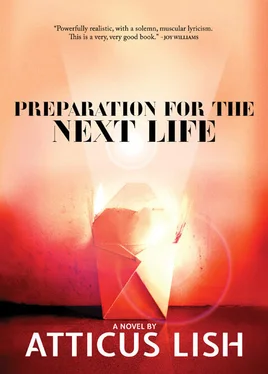Zou Lei was concerned by this, because it was a lot of money. How much time would he give her for a hundred dollars? Could she talk to the lawyer for a shorter time for less money?
The young woman turned on her heel and went back to the lawyer’s door and murmured with him again.
The lawyer stood up and came out of his office. He was an exceptionally tall man, wearing a white Brooks Brothers dress shirt, red and navy striped tie, and long black oxfords that clicked on the marble floor. He had a gold ring with a diamond in it on his little finger. He looked as if his feet could be rotated through 180 degrees — in other words that his knees were loose, like shopping cart wheels that spin around. He hurried out and stopped in the middle of the marble floor and said, Yeah, hi. So you can’t spend a hundred? He asked her what she needed help with.
Before she could answer, the girl came back and interrupted them. Zou Lei waited while he went with her and told her how to do something related to filing a real estate case. He came back and spoke to Zou Lei again. She didn’t know where to begin describing her problem. He cut her short. How much do you want to spend?
She tried to guess what to say.
Thirty dollars.
Fine. She’ll make you out a bill. I’ll talk to you when I’m done.
He hurried back into his office and shut the door and started talking in English again. There were no windows, but there was a clock to watch the time. Another door opened and an American came out wearing a yarmulke and said goodbye to all the women in the office, who ignored him.
Tell Alvin I’m going, he said.
He hit the button on the elevator and waited, and when it came, two Chinese men who looked like deliverymen got off and sat themselves in the other two rosewood chairs and put their plastic bags between their feet and read the Sing Tao. The elbow of the one closer to her pushed into her arm. She leaned sideways and felt her wallet under her hip.
She got up and went back into the clerk’s office and got the attention of a different, older clerk, a prim straight-haired woman with glasses and painful-looking acne. Zou Lei could tell she was from Mainland China and addressed her in Mandarin.
I’m supposed to talk to the lawyer, but that girl never told him what I’m here to talk about, so how do I know if it will have any significance, and then thirty dollars will be gone for nothing.
What do you want to see him about?
I want to do immigration. I don’t want to get caught.
By Immigration?
Yes, by Immigration. I was caught once already and it’s fearful.
The woman let her sit in the seat at the side of her desk. They spoke Mandarin.
Do you have a case?
No. This is the first time to see a lawyer.
How did you come to this country? Did you have a visa?
No, no visa.
How did you come here? You…
Snuck in.
Snuck in from Mexico? In a truck?
Yes, a truck.
When they arrested you and let you go, they would have given you a piece of paper. Do you have it?
I think so.
Let me see it.
No, on my body I don’t have it. I have it at home.
Bring it next time, because that will make a difference when filing a petition. You want to file a petition?
Okay. Yes. I think, whatever is possible. I don’t know what is possible right now. I want to stay in this country if it’s possible. An American says he can marry me. That’s the real thing I want to know. Can I get married with him even if I have no identity?
The lawyer came out of his office to put a folder in a wire basket, saw Zou Lei and said, So you’re not going to talk to me after all? Okay. He asked a secretary for the 285 Broadway case and went back into his office.
You should get married right away to help your petition, the woman told Zou Lei.
Can I do it with no identity?
Is he American?
Yes, a soldier.
And he’s an American citizen?
Yes. Citizen.
You go to the marriage office and check. They will give you the requirements. But you should do that as fast as possible and then come back when you’ve gotten married. Then you can open a case.
She told Zou Lei that she would have to leave the country and go back to China for a visa interview. It was possible that her application might take an unspecified length of time and might not be approved, leaving her stranded in China.
Zou Lei questioned whether she’d even be able to fly back without her passport. The woman told her that you could apply for a passport at the Chinese consulate, but that doing so was risky, because, she said, I think they check, and it could make it easier to be deported.
She echoed Zou Lei’s fear that it was very easy to get arrested, and that that was something she had to avoid at all cost, because since 9/11, there was no telling what immigration arrest could entail.
Then she seemed to contradict what she had said earlier, now implying that at no point would Zou Lei have to go back to China. She mentioned that the laws had become very broad and that the government was unpredictable at this time. Things might become easier in the future.
They talked for no more than three minutes — the woman spoke rapidly and expressionlessly, her eyes invisible behind her glasses — and then, as if a clock had run out, she stopped talking to Zou Lei and returned her attention to her computer. The phone bleeped, she picked it up, said, Yes, I’m doing that, and hung up.
Thank you for your help, Zou Lei said. Do you have a card?
The woman gave her a card, but when she looked at it, she saw it was the same business card they had up front: it was simply the lawyer’s card.
As she was leaving, the lawyer came out and spoke to her while he put another folder in the wire basket. I overheard you. If you’re getting married, it better be a real marriage or you’ll be in big trouble. That I’ll tell you for free. Free advice.
She didn’t understand what he meant. What do you mean? Maybe we’re ordinary people, but the feeling between us is real.
AFTER LEAVING THE LAWYER’S office, she went directly back to Flushing to see Skinner. While they were talking, he got up and opened his refrigerator. He stood for a full half a minute staring into it, not saying a word.
What is it?
Look.
There was six-pack sitting in the fridge on the cruddy wire rack.
It’s beer.
Yup.
She didn’t understand what the problem was. He made a circuit of the basement looking in the trash, kicking over his shirts, looking under them, checking under the bed while she gazed after him, puzzled by his behavior. He circled back to the kitchen, flipping the cupboard doors open and shut. He finally came to rest by the counter with an expression on his face that said he knew something and wasn’t happy about it.
She asked him what was going on. He shook his head.
Nothing. Some bullshit.
Had he lost something?
I had two six-packs in there.
So?
Now there’s one.
You drink it?
Nope.
You sure?
Yup. He pointed at the trash. No empties.
Someone take it?
Roger that.
Who?
I know who.
Who?
He lit a cigarette.
Dude who lives upstairs.
She didn’t know who he was talking about and assumed he meant the man they heard yelling at his daughter.
Any indication of a problem with his landlord sent a vibration back up the network of her plans. She and Skinner had just been talking about her visit to the lawyer, which ultimately connected to everything, including where to live. She had speculated that she might move in with him here.
What you are going to do?
He shook his head as if it wasn’t worth mentioning. He took one of the six beers that remained out of the icebox and set it on the table and for a minute watched the water run down the outside of the cold can. Wasn’t he going to close the icebox door? Oh, yeah. He drew on his cigarette and closed the door and changed the subject back to the lawyer.
Читать дальше












